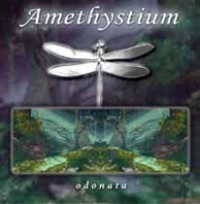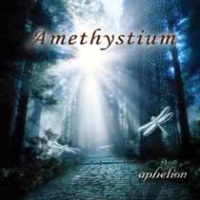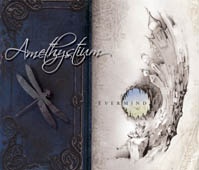| Amethystium is a project of the young Trondheim-based musician Øystein Ramfjord. His cinematic and highly atmospheric music is a fascinating blend of new age and more upbeat ethno-ambient styles.
So who is Amethystium?
I think of Amethystium as a studio-project/solo-project of mine, occasionally involving other people. I don’t consider it my personal artist-name, as I’d rather not personalize it much. In a way it serves partly as a way of musical expression without putting myself in the limelight.
On you website, two demo’s are listed of which the music later would end upon “Odonata”. Please tell some more on how you started…
I guess the real start would be when I was around 14 and got “obsessed” with recording my own compositions and ideas, using a keyboard with a basic
internal sequencer, a guitar, and a stereo tape recorder that enabled me to
record two separate mono tracks. I did that for a few years alongside of
playing with others in groups, but eventually it just took over completely.
I guess being a bit of a control freak has something to do with it. As I started Listening to some electronic based music, I began to get a better idea of what I wanted to do musically myself, and Amethystium grew out of that. The first songs that would later be released were completed in 1998, and the first demo was recorded in late 1999.
The three albums you made until now are part of the so called “Dragonfly Trilogy”; what did you have in mind?
Well, it’s nothing pretentious – and I didn’t set out to make a trilogy at all initially. It’s more a way of grouping them together in retrospect, feeling that they belong together, and then to start with blank sheets again.
The whole thing with the dragonfly becoming a sort of visual symbol or
logo for the project and album covers was inspired by an early childhood
memory. Now I kind of think of these three albums as my musical
childhood in a sense, though I don’t mean that in a put down way.
Can you explain some more on the difference of content & music of the three seperate cds.
I find it a little bit difficult to talk about the albums like that, since there aren’t any strictly organized intellectual concepts with each album -they’re more somewhat spontaneous, emotional and mental journeys than anything else.

In short though, I would say that for me personally “Odonata” is the most lighthearted and “un-self-conscious” record of them, probably partly because I was so young. I made it when I was 17 – 19 years old, with occasional parts, like the main theme of “Ethereal”, dating back from when I was 16. So it was made in a very playlike manner. (Editor’s note: In May 2004 the song “Odyssey” was also featured in the Walt Disney’s IMAX film “Sacred Planet”)
“Aphelion” feels a lot darker and “heavier” for me, even a little claustrophobic at times. I guess this is much due to it triggering my states of mind when working on it, but I think it shines through in the music for other listeners as well.
As for “Evermind”, I don’t have any real distance to that one yet, but I
think it is characterized mostly by its relative eclecticism in the moods and sounds.
I’ve read some reviewers criticizing it for being “too nice”, or not having any darkness in it, which I can understand if that’s how they perceive it, but I don’t feel that way about it myself. It might be less pronounced though.
I was expecting a lot of people wouldn’t like this record as much, and it
might be the one with the strongest “love it or hate it” factor, I don’t know. So far the feedback has been really good though.

After “Aphelion” had been released a short while, you said that the third album would take a while; but nevertheless within one year it actually arrived. How come?
I don’t quite remember when I said that, but “Aphelion” was finished in the late fall of 2002, while “Evermind” was finished in the early fall of 2004. So I spent almost two years with it, which is a good while. I don’t think I expected it to take much longer than that, although postponing it until 2005 was a very possible scenario in the later stages. It would have been the case if I hadn’t devoted the summer months completely to getting it ready in time.

Can you perform your music live?
No, I can’t perform the Amethystium material live, at least not without a lot of preparation. It’s not something I’ve given much serious thought to yet, but it would either require a big undertaking with the involvement of many musicians to play all the parts, or it would have to rely on extensive use of playback.
I think complex and multi-layered electronic music in general doesn’t lend itself well to a good live performance, and personally I’m much more
interested in continuing exploring and creating in the studio rather than
playing live for an audience.
How did you get in touch with the session-musicians which contribute to your albums ? What part do they play?
Some were local, and some I heard about and got in touch with via the Internet. The biggest and most extensive contribution so far is definitely the vocals on three of the songs on “Evermind”, by vocalist Lee Nisbet of Animus Mundi.
Her partner Stacy King Evans also contributed significantly on the engineering and arranging end, lifting the vocal parts to a higher level than I could have done alone. I believe they will have a full album out on their own in the near future, as Animus Mundi, which will definitely
be worth checking out when it’s released.
Which music or musicians have influenced you?
It’s a bit hard to pinpoint overall, as my taste in music has been quite varied and eclectic over the years. There are some obvious artists I should mention though, the ones that first got me interested in using synthesizers as a main instrument, and who definitely influenced me when it comes to Amethystium.
I think Vangelis was the first one I listened extensively to, though I also remember listening some to J.M. Jarre before that. Then I discovered Deep Forest, which was a big thing for me for quite some time, as well as Enigma. I would say that these are my biggest influences, though I’m probably influenced by music in other genres as well, in more subtle ways.
Do you like to work with other (electronic) musicians sometime?
It’s not something I’ve thought much about, but maybe. I’m more
interested in working with someone who can do things that I
absolutely can’t do myself though, like someone who plays some
obscure instrument.
What kind of instruments and recording techniques do you use?
I use for the most part hardware synthesizers, some sampling, and
the occasional other instrument, like guitars and some percussion.
The synth parts I usually record or program first in midi, and then record them down to digital audio on a PC running Sonar Producer. I make a basic mix along the way as I work on a song, and then I go back for the final mix towards the end.
So, what’s next after “Evermind” ? What plans do you have for the future?
I’ve started thinking about and working on a fourth album, though I don’t want to say anything about it yet – the “concept” is too wage yet, and all the ideas can still change. I’m very enthusiastic about it though!
Discography:
Odonata (2001)
Aphelion (2003)
Evermind (2004)
Website: www.amethystium.com |



